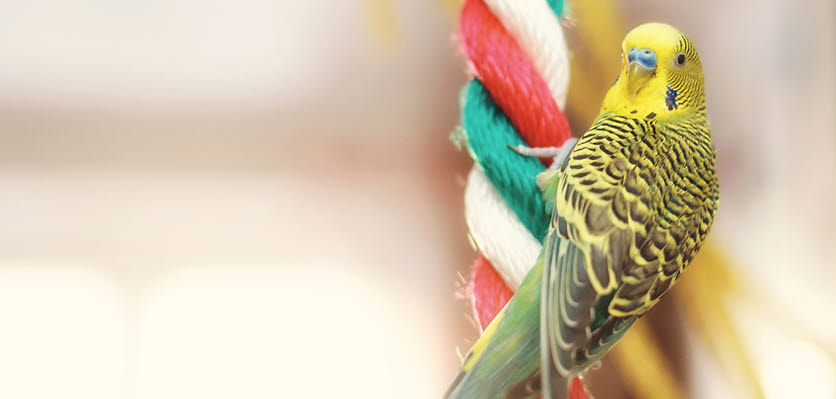Household hazards for birds

Birds are curious animals, and many of their antics bring us great joy. However, their tendency to chew and explore, coupled with their incredibly sensitive respiratory system, means we have to take extra care around the house to keep them safe.
Learn more about common household dangers for birds below.
Teflon materials
If your bird spends time inside your home, do not use Teflon-coated cooking appliances like pots and pans. Teflon contains a chemical called polytetrafluoroethylene (PTFE) which releases a colourless and odourless gas when heated on the stove.
This gas doesn’t seem to affect mammals, but it is toxic to birds and can kill them within 24 hours. The gas can travel, so even if your bird isn’t near the kitchen when Teflon-coated products are used, they can still become affected.
Temperature, humidity and air quality
Due to birds’ finely tuned respiratory system, they are more sensitive to changes in air temperature, humidity and air quality compared to mammals.
A climate that’s too dry, or too cold, can adversely affect your bird’s health. If you’re unsure what the best environment is for your species of pet bird, chat with your local bird and exotics veterinarian.
Other substances in the air that can make birds unwell include cigarette smoke, volatile cleaning products, perfumes, paint and varnishes. The general rule is, if you can smell it and it’s an offensive odour, it’s likely too dangerous for your bird. Keep these substances well away from your bird.
Essential oils
For the same reasons why you should avoid volatile odours like paint and perfumes, don’t use essential oil diffusers in your home if you have a bird. Essential oil diffusers might smell nice, however, the risk to your bird is very real. If you suspect your bird might have been exposed to any of the odours and gasses outlined above, immediately seek the advice of your veterinarian.
Ceiling fans and glass doors
Although birds are intelligent animals, they haven’t adapted to modern human inventions like ceiling fans and glass doors. Don’t have ceiling fans operating when your bird is free ranging around the house and consider obscuring or decorating glass doors to prevent your bird from colliding with the surface.
Galvanised cages
A wire cage that has been galvanised contains both zinc and lead. These metals can be toxic to birds, particularly as some birds develop an affinity for chewing on the wire of their cage. Use a cage made out of wire that doesn’t contain either zinc or lead, or consider ‘weathering’ a cage naturally for 12-months outside before using it. If your bird already chews the wire of its cage, closely monitor it for signs of lead poisoning which include weakness, inappetence, leg paralysis, tremors and circling. Contact your veterinarian if you suspect your bird might be suffering from lead or zinc poisoning.
Many everyday household items can present a risk to your pet bird. This list is not exhaustive, so if you would like more information, chat with your local bird or exotics veterinarian.
